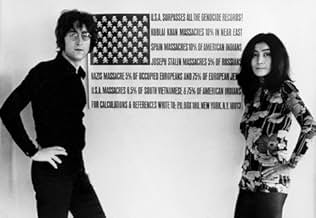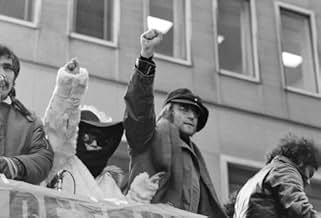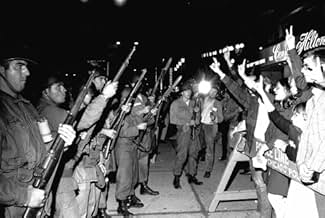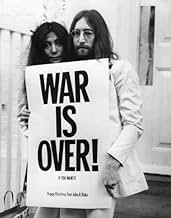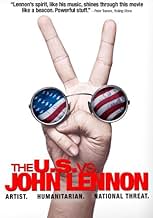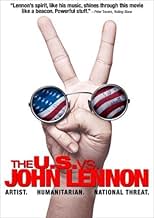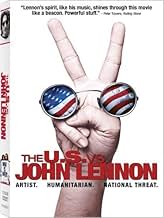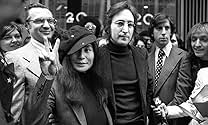NOTE IMDb
7,3/10
5,7 k
MA NOTE
Ajouter une intrigue dans votre langueA documentary on the life of John Lennon, with a focus on the time in his life when he transformed from a musician into an antiwar activist.A documentary on the life of John Lennon, with a focus on the time in his life when he transformed from a musician into an antiwar activist.A documentary on the life of John Lennon, with a focus on the time in his life when he transformed from a musician into an antiwar activist.
- Réalisation
- Scénario
- Casting principal
- Récompenses
- 2 nominations au total
John Lennon
- Self
- (images d'archives)
Avis à la une
I hope everyone sees this film, as it is a window into the life of an extraordinary person, who really did influence a generation with his music and his courage. But, I especially hope that the generations that came after John Lennon left us, so unexpectedly, have a chance to see this thoughtful and fitting tribute to the gentle artist who turned the hurt he experienced as a child into an international revolution with a spirit so open and willing to risk everything he had to teach the world that all we really need is love. This film explains to all of us, who were too young to understand what was going on, at the time, how John Lennon was persecuted by the U.S. government for simply expressing his opinion about the war in Viet Nam. How he was investigated, tapped, and followed, then threatened with deportation, in an effort to derail a tour that might have had a significant influence on the outcome of the 1972 presidential election, in which Richard Nixon was re-elected. The scenes of teenagers burning their Beatles records in protest of his quip that the Beatles had become more popular than Jesus, are eerily parallel with the Dixie Chicks fans who did the same thing. Excerpts from Nixon's speeches about the war are almost word-for-word the same rhetoric we get from Bush. This film is important, and moving, and includes some of the best music I know I'll ever hear in this lifetime. Go see it and get inspired.
I am too young to really remember John Lennon being alive and what I know of him is mostly based around the Beatles and his later solo efforts which, in my view, saw him becoming a bit of a peacenik under the influence of Yoko Ono. As a result this film sat on my recorder for quite a few weeks before I got round to watching it but I am glad I did because it is actually a very interesting film that is pitched perfectly to inform viewers such as myself who perhaps did not know anything about John Lennon in the latter stages of his life.
It goes without saying that the film is sympathetic to Lennon and what he was trying to do and I suppose this is a fault within the telling that the bias towards him as a person is inherently there. This will put off some viewers who simply disagree with him, draw in those that agree but to the casual viewer I doubt it will come over as a problem and indeed for me it was just something I observed rather than something that was an issue. Anyway, what the film did well for me was to acknowledge that Lennon was an artist and a peacenik but to move him beyond the images and songs that we all know. This gives him as a person more of a foundation and meaning because, viewed in context of his time he actually comes over as a key figure and an intelligent man (albeit an artist!).
I'm sure some will see this as a problem because they disagree with it but the approach works. Setting the foundation and showing Lennon speaking out (in his own way) builds well to make the later persecution by Nixon's Whitehouse to be a natural progression and believable rather than being a rather sensationalist newspaper headline (or indeed like the title of the film itself). The use of archive footage is really well done as it makes rightly makes Lennon the main character while the contributions are mostly relevant and edited into the main flow well.
An interesting and engaging documentary that sits as a fitting tribute to who John Lennon was, even if it focuses on a specific period in his life. Understandably slanted to the left politically, it will appeal to the casual viewer quite easily.
It goes without saying that the film is sympathetic to Lennon and what he was trying to do and I suppose this is a fault within the telling that the bias towards him as a person is inherently there. This will put off some viewers who simply disagree with him, draw in those that agree but to the casual viewer I doubt it will come over as a problem and indeed for me it was just something I observed rather than something that was an issue. Anyway, what the film did well for me was to acknowledge that Lennon was an artist and a peacenik but to move him beyond the images and songs that we all know. This gives him as a person more of a foundation and meaning because, viewed in context of his time he actually comes over as a key figure and an intelligent man (albeit an artist!).
I'm sure some will see this as a problem because they disagree with it but the approach works. Setting the foundation and showing Lennon speaking out (in his own way) builds well to make the later persecution by Nixon's Whitehouse to be a natural progression and believable rather than being a rather sensationalist newspaper headline (or indeed like the title of the film itself). The use of archive footage is really well done as it makes rightly makes Lennon the main character while the contributions are mostly relevant and edited into the main flow well.
An interesting and engaging documentary that sits as a fitting tribute to who John Lennon was, even if it focuses on a specific period in his life. Understandably slanted to the left politically, it will appeal to the casual viewer quite easily.
One of the younger reviewers commented:
"I couldn't help but compare the era and social climate around this movie to what we are experiencing today. I am disturbed and disappointed. Why is it that it seemed as if there were loads more people being active in what they believed back in those days. I understand that it was a different time, and many in the world were just learning to use their voices... Perhaps we feel that we just don't know enough about a subject to get behind it and speak out? ... Perhaps large protests are just being overlooked because we as viewers or the media is over it... I am just wondering why I haven't done more. Why does it seem as if people today (not just my "generation" or my "community") are fearful or apathetic towards fighting for what they think is right? I don't want to preach or be dramatic here - I'm not telling you to view things my/their/our/its/his/her way. I'm just saying, I can't imagine that we've gone through life without seeing some sort of injustice - there has to be something you've seen that you think is wrong... why not say something about it? Is being charitable enough anymore? Awareness is key. Why is there this silence amongst us?"
Perhaps I'm being too simplistic, but I've often thought as a survivor of the Viet-Nam era, that the main reason we haven't seen protests of the magnitude depicted in The US vs John Lennon in recent times is simply the absence of the draft. Plenty of people again object to the war situation, but without the threat of involuntary servitude there simply is no critical mass. The fear of self, friends, and family being rounded up and shot proved great motivation to get people out in the streets back then. The censorship of the media imposed since Viet-Nam (embedded journalists, qv) has also helped still the voices.
So at the very least, this film has helped present an historical perspective all but absent in the present day. Viet-Nam so divided the country that the divisions remain today. Yet that war is curiously neglected in our educational curricula.
Beyond that is revealed a portrait of John Lennon, artist and young man. Lennon, the single one of the Four who strove at great personal cost to better the world with far more than silly love songs is revealed here in a montage of film and stills that conveys far more than the press of the time was able or wiling to.
The film opens with footage from his 1971 appearance at the John Sinclair Freedom Rally at Crisler Area in Ann Arbor, Michigan. As a former UM Ann Arbor Student I particularly appreciate how the producers of the film illustrate the pivotal nature of that event. At the time the event seemed like a big deal locally, but one that was lost amongst the din of social commotion. As close as I was geographically, I didn't realize then just how influential Lennon's (or Sinclair's) involvement was in the successful movement to end the war.
I suggest that any student (young or older) of how that peace movement progressed back then should see this film. Serious students should see it more than once. In addition to the collection of seldom seen film footage, there is a very fine sound track. See the film on the big screen if you can. I'll put my order in for the DVD as soon as it can be had, but the big screen, hi-fi version rocks.
"I couldn't help but compare the era and social climate around this movie to what we are experiencing today. I am disturbed and disappointed. Why is it that it seemed as if there were loads more people being active in what they believed back in those days. I understand that it was a different time, and many in the world were just learning to use their voices... Perhaps we feel that we just don't know enough about a subject to get behind it and speak out? ... Perhaps large protests are just being overlooked because we as viewers or the media is over it... I am just wondering why I haven't done more. Why does it seem as if people today (not just my "generation" or my "community") are fearful or apathetic towards fighting for what they think is right? I don't want to preach or be dramatic here - I'm not telling you to view things my/their/our/its/his/her way. I'm just saying, I can't imagine that we've gone through life without seeing some sort of injustice - there has to be something you've seen that you think is wrong... why not say something about it? Is being charitable enough anymore? Awareness is key. Why is there this silence amongst us?"
Perhaps I'm being too simplistic, but I've often thought as a survivor of the Viet-Nam era, that the main reason we haven't seen protests of the magnitude depicted in The US vs John Lennon in recent times is simply the absence of the draft. Plenty of people again object to the war situation, but without the threat of involuntary servitude there simply is no critical mass. The fear of self, friends, and family being rounded up and shot proved great motivation to get people out in the streets back then. The censorship of the media imposed since Viet-Nam (embedded journalists, qv) has also helped still the voices.
So at the very least, this film has helped present an historical perspective all but absent in the present day. Viet-Nam so divided the country that the divisions remain today. Yet that war is curiously neglected in our educational curricula.
Beyond that is revealed a portrait of John Lennon, artist and young man. Lennon, the single one of the Four who strove at great personal cost to better the world with far more than silly love songs is revealed here in a montage of film and stills that conveys far more than the press of the time was able or wiling to.
The film opens with footage from his 1971 appearance at the John Sinclair Freedom Rally at Crisler Area in Ann Arbor, Michigan. As a former UM Ann Arbor Student I particularly appreciate how the producers of the film illustrate the pivotal nature of that event. At the time the event seemed like a big deal locally, but one that was lost amongst the din of social commotion. As close as I was geographically, I didn't realize then just how influential Lennon's (or Sinclair's) involvement was in the successful movement to end the war.
I suggest that any student (young or older) of how that peace movement progressed back then should see this film. Serious students should see it more than once. In addition to the collection of seldom seen film footage, there is a very fine sound track. See the film on the big screen if you can. I'll put my order in for the DVD as soon as it can be had, but the big screen, hi-fi version rocks.
For those who are too young to remember the real John Winston Ono Lennon -- this film is a good introduction to why he mattered so, why so many people were (and are) devoted to him as an artist and a man, why he was truly the most original voice of his generation.
The film is not perfect -- but in its defense, it covers an extraordinary amount of material and does it well.
Lennon lived 100 lifetimes between 1969 and 1975.
This film concentrates on the biggest conflict he faced at that time: his struggles to remain in the US, and the right-wing paranoia (exemplified by FBI director J Edgar Hoover and Nixon's hatchet man, John Ehrlichman.)
Lennon's sincerity, his naiveté, his charisma shine throughout.
Yoko has been attacked (so what else is new) for being such a strong presence in the film but she was right there beside him. They lived it all together. And she does not use her camera time to diminish him in any way.
Strong recommendation -- primarily because we have to remind ourselves that there are times to speak up and times to act.
John Lennon: we miss you so.
The film is not perfect -- but in its defense, it covers an extraordinary amount of material and does it well.
Lennon lived 100 lifetimes between 1969 and 1975.
This film concentrates on the biggest conflict he faced at that time: his struggles to remain in the US, and the right-wing paranoia (exemplified by FBI director J Edgar Hoover and Nixon's hatchet man, John Ehrlichman.)
Lennon's sincerity, his naiveté, his charisma shine throughout.
Yoko has been attacked (so what else is new) for being such a strong presence in the film but she was right there beside him. They lived it all together. And she does not use her camera time to diminish him in any way.
Strong recommendation -- primarily because we have to remind ourselves that there are times to speak up and times to act.
John Lennon: we miss you so.
Those who do not learn from history are doomed to repeat it. If "The U.S. vs. John Lennon" is anything, it's an examination of the similarities between the Nixon Administration and the national debacle that was the Vietnam War, compared to the current Bush Administration and the national debacle that is the Iraq War. The difference, of course, is that Nixon had John and Yoko Lennon to contend with. Who do we have to lead our protests and write our anthems? Michael Moore? Not good enough.
When Lennon moved to New York City in 1970, the Nixon Administration was terrified that he had the power to organize the anti-war protesters and affect the outcome of elections (particularly Nixon's 1972 run for re-election). Lennon was wiretapped and followed by the FBI (which was being used at that time to "quell decent"). The Immigration and Naturalization Service tried for five years to deport him, but he got a lawyer and fought back, and in 1976, on his birthday, on his son Sean's birthday, he learned that he and Yoko had won their case, and they could stay.
"The U.S. vs. John Lennon" makes you want to take a stand, organize a protest, demand peace, and stick it to the man!
When Lennon moved to New York City in 1970, the Nixon Administration was terrified that he had the power to organize the anti-war protesters and affect the outcome of elections (particularly Nixon's 1972 run for re-election). Lennon was wiretapped and followed by the FBI (which was being used at that time to "quell decent"). The Immigration and Naturalization Service tried for five years to deport him, but he got a lawyer and fought back, and in 1976, on his birthday, on his son Sean's birthday, he learned that he and Yoko had won their case, and they could stay.
"The U.S. vs. John Lennon" makes you want to take a stand, organize a protest, demand peace, and stick it to the man!
Le saviez-vous
- Citations
Gore Vidal: Patriotism is the last refuge of the scoundrel.
- Bandes originalesJohn Sinclair
Written by John Lennon
Performed by John Lennon
Courtesy of Capitol Records
Under license from EMI Film & Television Music
Meilleurs choix
Connectez-vous pour évaluer et suivre la liste de favoris afin de recevoir des recommandations personnalisées
- How long is The U.S. vs. John Lennon?Alimenté par Alexa
Détails
Box-office
- Montant brut aux États-Unis et au Canada
- 1 109 146 $US
- Week-end de sortie aux États-Unis et au Canada
- 69 143 $US
- 17 sept. 2006
- Montant brut mondial
- 1 408 065 $US
- Durée1 heure 39 minutes
- Couleur
- Rapport de forme
- 1.78 : 1
Contribuer à cette page
Suggérer une modification ou ajouter du contenu manquant

Lacune principale
By what name was Les U.S.A. contre John Lennon (2006) officially released in India in English?
Répondre

